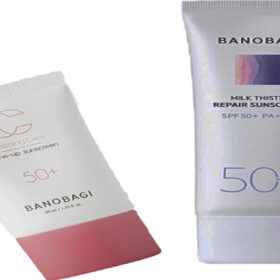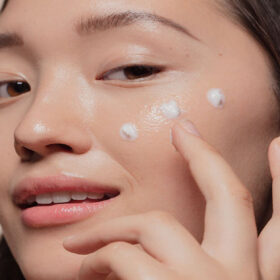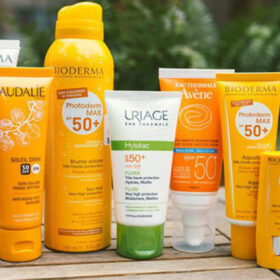Skip to the main content of the article(see)
Why does using sunscreen make it darker? Please join us to find out in this article.
Many of us women still believe that using sunscreen is to prevent skin darkening and the more you use it, the more effective it will be. But in reality, there are some cases where the opposite is true: The more you use sunscreen, the darker your skin becomes, and some skin even experiences premature aging such as wrinkles and larger pores… So why does using sunscreen make it darker? Let’s find out.
Why does using sunscreen make it darker?
- Applying an insufficient amount of sunscreen and not reapplying it after a period of use will cause the cream to lose its effectiveness.
- Only use sunscreen when you have to go out when it’s sunny.
- You only apply cream on your face but forget about your body.
- Only use sunscreen without using other factors to shield the skin such as hats, jackets, umbrellas, etc.
- If you don’t remove your makeup or carefully remove it at the end of the day, you’ll allow the sunscreen layer to stick to a lot of dirt and impurities, making your skin dull.
To help you better understand the reasons why using sunscreen turns darker, please join us in answering the 3 questions below to see what mistakes you made when using sunscreen.

Have you chosen the right sunscreen to use?
This is the first question that you need to reconsider when you realize that your skin, despite using sunscreen, is darker:
- Expiry date: For each bottle of sunscreen, after you open it to use, you should only use it within about 6 months. If this time period is exceeded, the sunscreen will be significantly less effective, even if the expiration date on the bottle is up to 1 or 2 years.
- Sun protection index: Sunscreen with an SPF level of 30 or higher is recommended. But if your skin has acne or is sensitive, you can absolutely use products with SPF 15 which is enough.
- Function of sunscreen: Sunscreen often has many additional uses such as whitening, concealing or tightening pores… Therefore, depending on your skin’s needs, you should choose one for yourself. suitable sunscreen bottle.
Are you applying sunscreen properly?
In fact, the effect of sunscreen only protects the skin for a certain period of time and this depends entirely on the SPF sun protection index. To put it simply, 1 SPF is equivalent to 10 minutes of sunscreen protecting the skin in the sun, so if you use a sunscreen with SPF 30, it means protecting the skin for 5 hours. Therefore, sunscreen needs to be reapplied every 2-3 hours for the skin to be best protected.
Sunscreen should not only be applied to the face but also to the neck, shoulders, back, arms and legs. Currently on the market, there are quite a variety of sunscreens, some just for the face and some for the whole body, so you need to choose the right cream for each location to maximize effectiveness.

Is using enough sunscreen?
Normally, the amount of sunscreen for the face will take about 2 – 3 ml (equivalent to about 5 peas) and when applied to the body, a larger amount is needed. Besides, each person’s skin will also have a different ability to sunburn depending on skin color and skin health. Currently, there are many studies that show that the whiter the skin, the higher the sun exposure and is more susceptible to the harmful effects of sunlight or environmental pollution than darker skin. Therefore, for white skin you should use sunscreen more often.
How to use sunscreen properly
- In the skincare process, sunscreen is the last step, after applying moisturizer and before starting makeup.
- Apply sunscreen 20 – 30 minutes before going outdoors to allow the cream to penetrate the skin, creating a solid protective layer on the skin.
- You should not apply sunscreen once, but reapply every 2-3 hours if you are very active, adjusting the number of times accordingly to ensure the protective layer on the skin is continuously maintained. .
- Use sunscreen in combination with wearing sunscreen, mask, sunglasses, socks…
Do you know the reason why using sunscreen makes it darker? Hopefully through this article you will have more useful information to protect your skin.


















